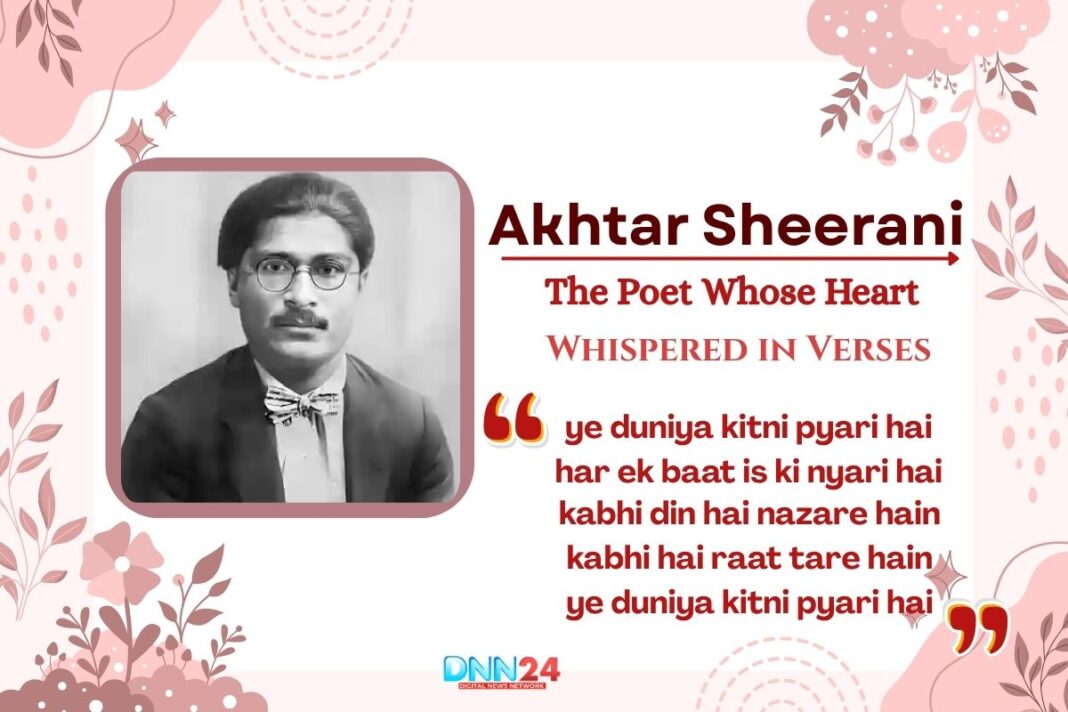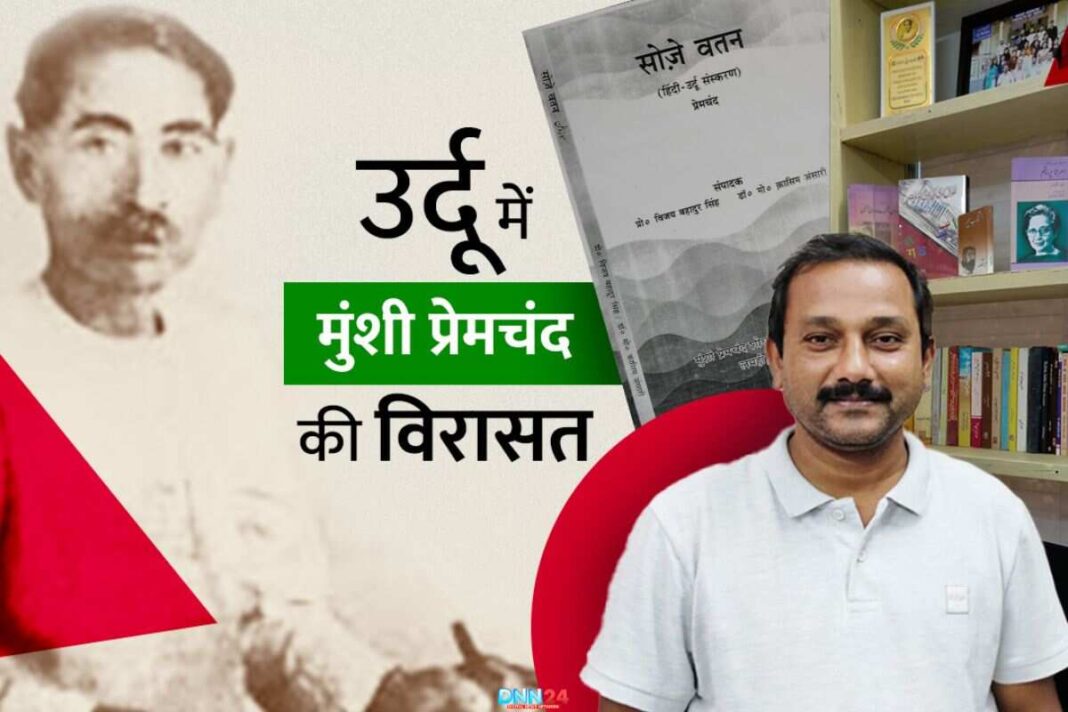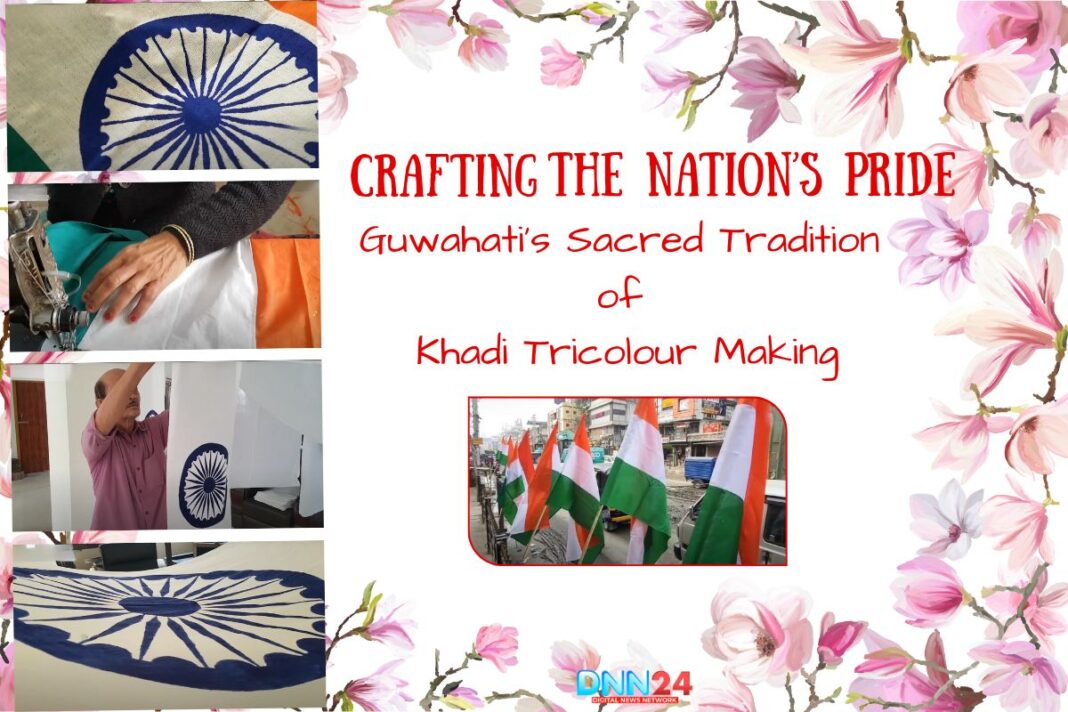Born Mohammad Dawood Khan on 4th May 1905 in the princely town of Tonk, Rajasthan, Akhtar Sheerani’s early years were in privilege and paradox. Hafiz Mahmood Sheerani, the son of a great scholar, had a clear vision for his son’s future, Dawood. Dawood, a grandson of a great scholar, would be a great scholar who speaks Arabic and Persian and carries the intellectual tradition. Home life was a mixture of discipline, devotion and curious learning daily.
ai dil wo aashiqi ke fasane kidhar gae
Akhtar Sheerani
wo umr kya hui wo zamane kidhar gae
Family lore spins around his childhood — like the day, too restless to sit in lessons, Dawood sneaks out to watch a local wrestling match, amazed by the wrestlers’ strength. His father does not get angry but takes Abdul Qayyum Khan, a famous wrestler, to teach young Dawood the art and hopes that muscle discipline will soften the poetry. But Dawood’s heart beats for other things — words woven with emotions, sighs, and stars.
wo kabhi mil jaen to kya kijiye
Akhtar Sheerani
raat din surat ko dekha kijiye
Rebellion, Relocation and the Flash of Poetry
Akhtar was raised during the era of political upheavals in his teen years. His family was exiled when a rebellion against the Nawab of Tonk occurred. They had to find new roots in Lahore when his father was under a cloud of mutiny. It was the Lahore of dreams and lyric revolt, the city that had smouldered with fire as it spoke of defeat. This is where Akhtar’s formal education bloomed.
kuchh to tanhai ki raaton mein sahaara hota
Akhtar Sheerani
tum na hote na sahi zikr tumhaara hota
He had his Munshi Fazil and Adeeb Fazil, literary achievements uncommon for a young man in exile. But behind this success lay a subconscious longing: he wanted not to be a student of form but a wayfarer of the wilderness of poetry.
main aarzu-e-jaan likhun ya jaan-e-arzu!
Akhtar Sheerani
tu hi bata de naz se iman-e-arzu!
Maulana Tajwar Najibabadi became his mentor, and under him, Akhtar found what he called as the sunlight of his soul. The years he spent editing magazines, learning under Allama Tajur and adapting children’s plays gave his poetry a newness and honesty that could not be ignored easily. He published his first poetic works, and a new pen name was born: Akhtar Sheerani, the shining star.
kya kah gai kisi ki nazar kuchh na puchhiye
Akhtar Sheerani
kya kuchh hua hai dil pe asar kuchh na puchhiye
The Love That Was Never Named: Untold Stories of Salma
Ask any admirer of Akhtar Sheerani about the greatest mystery of his life, and the name “Salma” glides into the air like perfume. There are legends. Was she real or imagined, or was she a bit of both? His letters to some unseen woman, of whom none ever saw a trace, were interminable, and each one a love song, and the friends would laugh at him in the nights in Lahore. His real letters to Salma, which he sometimes wrote at night, became so celebrated that magazines were published in special editions devoted to their mysteries.
kaam aa sakin na apni wafaen to kya karen
Akhtar Sheerani
us bewafa ko bhul na jaen to kya karen
Others say he had but one glimpse of her, above the clouds of the monsoon in a passing, saccharine encounter which branded his heart forever. Some say Salma was an allegory of beauty, loss, or time. Akhtar did not mention. But all the poems, whether Ae Ishq Kahin Le Chal or O des se aane wale bata, are blue in longing, tinged with suppressed pain and hope.
mujhe apni pasti ki sharm hai teri rifaton ka KHayal hai
Akhtar Sheerani
magar apne dil ko main kya karun use phir bhi shauq-e-visal hai
Brawls, scandals and the cost of being a genius
There was darkness in Akhtar’s life behind his glory as the Poet of Romance. His passion with Salma turned into unfulfilled desire, and the heartbreak was so scarring that even the best verse could not heal it. Most people do not realise that Akhtar was plagued by loss of love and loss.
mohabbat ki duniya mein mashhur kar dun
Akhtar Sheerani
meri sada-dil tujh ko maghrur kar dun
The sudden death of his beloved son Javed (nicknamed Zuboor), the suicide of his close friend Mirza Shuja Khan, and the drowning of his son-in-law plunged his household into the depths of sorrow. The rumours of his death, some of which had it that he died alone and his body was lying unclaimed, only contributed to his mythos.
un ko bulaen aur wo na aaen to kya karen
Akhtar Sheerani
bekar jaen apni duaen to kya karen
His father and he did not have a good relationship, particularly when his early infatuations were discovered. Nevertheless, Akhtar never stopped writing; in his poems, he poured out his pain in verse that glowed with his vulnerability. He had wandered in the bohemian haunts of Lahore and, as was his manner, was generally drunk. He had thrown money at some poor paanwala who had been softened by his civil speech and had not brought relief to himself.
na bhul kar bhi tamanna-e-rang-o-bu karte
Akhtar Sheerani
chaman ke phul agar teri aarzu karte
Rewriting the Norms: Writing for Children, Women, and the World
Akhtar Sheerani’s influence stretched far beyond adult hearts enthralled by tales of romance. People (critics and ordinary people) were surprised when he published a book of poems in Hindi, a children’s book titled Phulon Ke Geet. It was unheard of: a poet of passion and pathos writing for little ones! In the verses, there was what the adults so easily misplaced, the wonder and delight that revolved in every line.
aarzu wasl ki rakhti hai pareshan kya kya
Akhtar Sheerani
kya bataun ki mere dil mein hain arman kya kya
He went a step further to glorify the role of women as not only beloveds but mothers, daughters and creators. His poems made three-dimensional portraits which were sensitive and daring. His prose was also adventurous; one of his five tales had been composed in a night, a story his friends were fond of relating, marvelling at the fecundity of his imaginative fires.
un ras bhari aankhon mein haya khel rahi hai
Akhtar Sheerani
do zahr ke pyalon pe qaza khel rahi hai
He edited magazines that nurtured new talents, was much sought after for his ability with stories and translations, would now and then contribute columns under fantastic noms-de-plume, and would love the disguise as much as the message.
wo kahte hain ranjish ki baaten bhula den
Akhtar Sheerani
mohabbat karen KHush rahen muskura den
The Final Chapter: Lonely Goodbyes and Lasting Legacy
Fame and fevered living left Akhtar Sheerani frail. His father died in 1946, and he was left drifting both financially and emotionally. Whiskey was misery and joy. His health went back; his heart, they said, never really cured of loss. Akhtar took his final bow in a hospital bed on 9th September 1948, miles away, and in front of people who never saw his brilliance.
kis ko dekha hai ye hua kya hai
Akhtar Sheerani
dil dhaDakta hai majra kya hai
There are tales of his last days–one version is that he was alone; another that friends flocked to him. But what is left are the poems that he left: his soul breathes in every line, his rebellious gaiety against the pain is the rhythm of the rhyme.
agar wo apne hasin chehre ko bhul kar be-naqab kar de
Akhtar Sheerani
to zarre ko mahtab aur mahtab ko aaftab kar de
He is not only present in Urdu literature as the Keats of Urdu but as a troubled revolutionary – one who was not afraid to write beautiful things in the face of tragedy, to sing joy in the face of sadness and to believe, always, in the curative power of love and words.
aashna ho kar taghaful aashna kyun ho gae
Akhtar Sheerani
ba-wafa the tum to aaKHir bewafa kyun ho gae
Akhtar Sheerani’s story is not just that of a poet, but of a heart unafraid to break and a soul unafraid to sing so that the world might listen and remember.
Also Read: Talib Chakwali: A Life Woven in Words, Loss, and the Search for Meaning
You can connect with DNN24 on Facebook, Twitter, and Instagram and subscribe to our YouTube channel.



